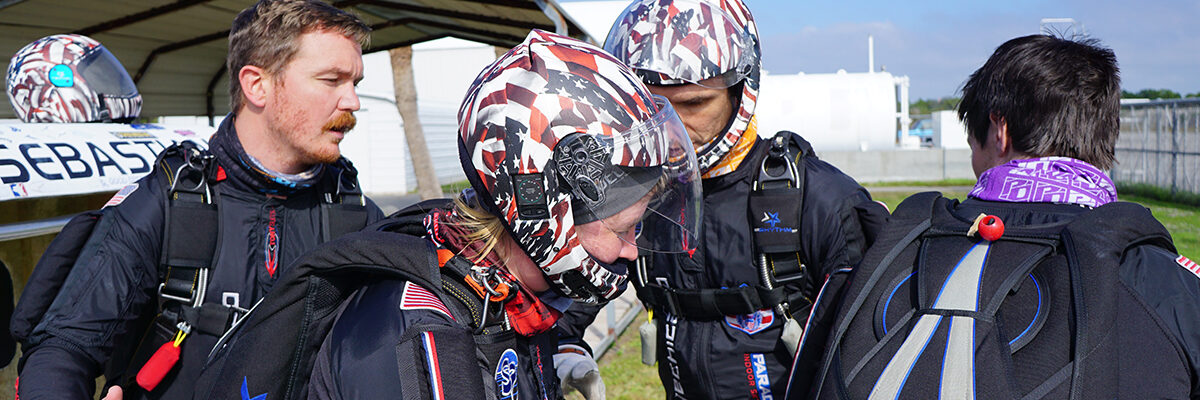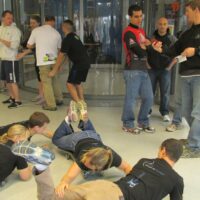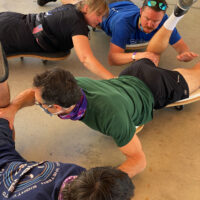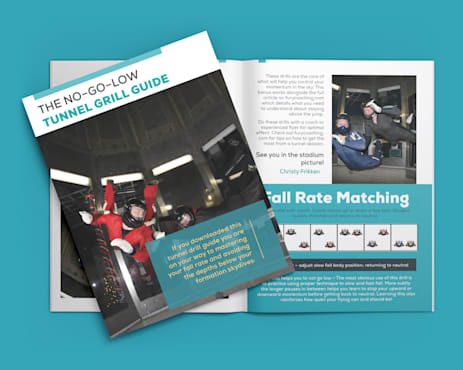How pro teams dirt dive
Monday, January 3, 2022

How does Rhythm do their dirt diving? Is prep different than amateur teams?
Here is how the professional teams I prep training skydives. My experiences are from Fury and Rhythm, but I have ducked in and out of others to know it isn’t too different elsewhere.
Comp prep vs. daily prep
Preparing at a meet is different than daily prep. For example, in competition, we follow a disciplined process that includes walking, creeping, mocking, and re-walking each dive. This procedure is the same as what we teach for competition.
There are more significant differences between us and amateurs in our day-to-day plan.
Beginning of the day and in batches
First, we prepare larger batches of jumps at the beginning of the day. We do many jumps in a row, so having them all set makes sure we have enough skydives ready.
Very experienced flyers can recall more details about a jump for longer. For example, if we creep angles in the morning, we can remember crucial movements and pieces that need special attention later in the day.
Spot creeping
We don’t creep every dive when we do tunnel. But we do “spot creep” or look at specific angles we know are likely to cause issues. By identifying the potential problems in the walk-through, we hit the vital elements without having to creep 50 dives in a day.
While skydiving, we might re-creep a weird transition in the middle of the day if we have time. No one is too shy to say, “Hey, can we lay that down real quick?”
Finally, if we are doing some of the jumps as competition training, we will creep it immediately before doing it. Again, this will simulate the fuller, more formal preparation we do for meets.
No one is too shy to say, “Hey, can we lay that down real quick?”
Creep First, Walk Later
In our morning prep, we don’t walk jumps first. Instead, we jump right to the creepers. We can get the dive flow by glancing at it. It helps speed up complex engineering since we don’t debate options standing.
In contrast, after creeping in the morning, we walk dives as much as we can before we board. We try to get a few pages in as a reminder, even while running to the plane.
Efficient and fast
Pros prep fast. We get the dive quickly because we are familiar. We talk less and try more. Angles and other requests get resolved quickly.
The most significant time sink for us is engineering. If there is a question, we try each time a few ways before debating the differences. If you see us chatting forever on the boards, we are picking engineering.
Less peeping, more creeping
If something is wrong, we point it out, redo it, and get it done. As a result, there is a faster cycle between observing a problem, retrying it, and moving on. In addition, we don’t refute requests as much as amateurs do; we comply with requests quickly.
Some of this directness is focus-related. We are present and attentive to details needed for each dive. We don’t stray from the process as much as less experienced groups.
Creep until happy
Everyone is responsible for feeling prepared. If someone needs more time, we keep going without question. It is not uncommon to ask for another page or two when someone wants more practice. No one complains or comments; we keep going until everyone feels ready.
Pro teams creep in large batches, identify the trouble bits, work efficiently, and execute instead of chat. When you are ready, try to sprinkle some of these prep habits into your training to see if they work for your team!





